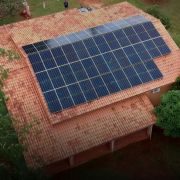The Yudjá people and Hoasca Tea
Duarte Antônio Guerra*
| April 27, 2023

The story of the Yudjá people and Hoasca Tea can be told from many perspectives. What I am going to report is what I was able to see based on my experience, what I heard from those who came before me, what is in the literature, what I heard from the Yudjás themselves and, finally, what I have experienced with them.
Still in the 1960’s, Geraldo Carvalho, one of the Mestres who shared life with Mestre Gabriel, was the first to verbalize the thought of giving the Vegetal (also known as Hoasca Tea in the UDV or Ayahusca in other places) to indigenous people, to which our Mestre pondered that this would only be possible with the support of the authorities. Over time, this idea began to take shape and, with the growth of the Beneficent Spiritist Center União do Vegetal, people with different professional backgrounds came to join this institution.
In this way, in 1996, dental surgeon Eduardo Mattos Biral arrived at the Center together with his wife, Estela, bringing his background and experience of 18 years of work and shared living with the indigenous people from the Xingu Indigenous Territory, where he resided in villages during the large part of this period.
As if what happened was finely weaved by Mestre Gabriel, shortly after the arrival of Eduardo Biral, Mestre Jair Gabriel finds out that this brother had worked with the indigenous people of the Xingu and in his first conversation with Biral, he orients him to follow firmly in the União so that after he receives his Star of Mestre, he can take Vegetal to the indigenous people, making the case that they are from nature and will find it easy to enter into the enchantments.
Distribution of the Vegetal to the indigenous people
Beginning in 1996, once in the Cadre of Mestres, Biral begins distributing the Vegetal to some indigenous people from different ethnic groups each time that he goes to Xingu for this work as a dentist. Among those attended to is chief Raoni, with whom he has a father-son relationship, who told about very beautiful, indescribable things about his first experience with the Hoasca Tea. Another group of people attended to by Mestre Biral, who showed interest in the Vegetal, were the Panará, whose lands are in the south of Pará, where they have even planted Mariri and participated in Sessions when Biral was with them and took the Vegetal with him. It was with these people that, in 2010, the first health activity of the Medical-Scientific Department (Demec) of the UDV was carried out, which was repeated the following year.
From the first time that the Yudjás had contact with the Vegetal, they demonstrated a close connection with the Hoasca Tea, which from then on motivated them to want to continue communing with this tea. Some of these indigenous people showed signs of being reunited with something that had belonged to them in other times, remembering the reports of their ancestors when they stated that “they had lost it, but they had to find it again” because successive migrations took them away from the areas where the plants used in the preparation of this tea were found.
This ethnic group has impressed us with the weight of their firm persistence to continue communing with Hoasca, as well as with their disposition to relearn how to prepare the tea and cultivate the necessary plants for this, the Mariri (Banisteriopsis caapi) and the Chacrona (Psychotria viridis).
The formalization of this desire to continue using the Vegetal took place through a request sent to the General Representation of the União do Vegetal in 2012, which stated the need for support in the supply of tea and assistance in planting the species so that they would reach self-sufficiency in the cultivation of these plants and, since then, the Center has been contributing towards this.
That same year, in a meeting held at the Center’s General Headquarters, it was established that the Yudjás would be given freedom to find their way, linked to their cultural roots, of working with Hoasca Tea, and the people responsible for this work would be responsible for providing appropriate guidance in the cultivation of Mariri and Chacrona, the preparation of tea and the responsible use of it, in harmony with the intentions of the founder of the União do Vegetal and in obedience to the laws of the country, which provide for the ritualistic use of the tea.
Friendship
In these 12 years of partnership, in which a strong and fruitful friendship has been built between the União do Vegetal and the Yudjá people, a growing number of individuals from the ethnic group, which numbers around 500 people, have shown an interest in receiving Hoasca Tea. Today, nearly all of them have and with some frequency continue religiously using “Wapa”, the name that they call the Hoasca tea (in Yudjá it means “medicine”).
Significant changes have taken place among them since then, including the use of alcoholic beverages having been banned from their villages. The value of what they consider medicine for the health and well-being of the Yudjás was expressed during the III Conference on Traditional Medicine, held in 2022, in a meeting where they detailed the meaning of health, expressing what this concept means to them:
“Union; Relationship with nature; Wapa (Hoasca) – resurgence of our spiritual culture – restoration of shamanism – revelations; Education: Nature is a University, Time is our professor; Wellbeing of the people; Very strong spirit that teaches us; Love – we are full of things we don’t perceive; We are guardians of nature – this rouses our psyche.”
The Beneficent Spiritist Center União do Vegetal also contributes, in the name of this friendship built, with work by the Medical and Scientific Department and the Department of Plantation and Environment, in addition to the actions of the Casa da União and the Novo Encanto Association for Ecological Development, affiliated entities to the Center that have carried out a socio-environmental work of great value for these people that Orlando Villas-Bôas considered to be “faithful friends”.
The UDV develops this work guided by the Christian principles that govern the Center and by an attitude of love and respect for the original people of our country, true guardians of the forests and our roots as Brazilian people.
VIDEO
 English
English




Leave a Reply
Want to join the discussion?Feel free to contribute!